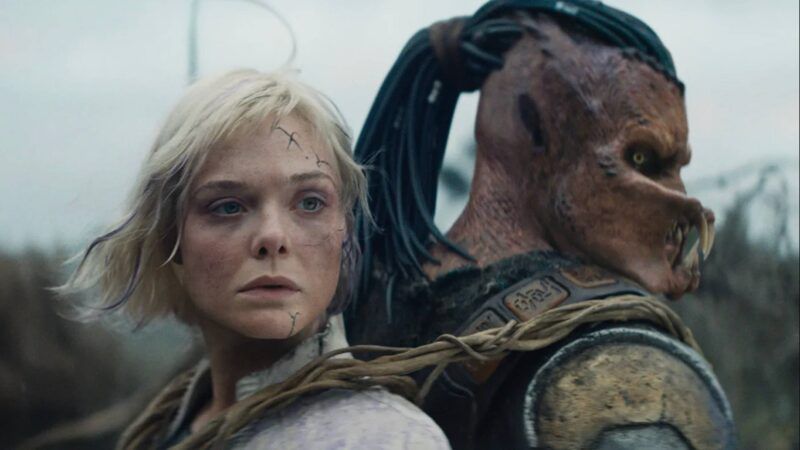In Predator: Badlands, the Predator Takes On Toxic Masculinity
Who knew that a Predator movie could be so cute?

Long before the phrase toxic masculinity first stomped its way into our lexicon, there was a great movie about the idea it represents. That movie was Predator, a movie about a band of absolutely gigantic, utterly badass dudes stalking an even bigger, even more badass alien hunter in the jungle. The dudes included steroidal man-mountains such as Carl Weathers, Bill Duke, Sonny Landham, and Jesse Ventura, who somehow wasn't even the most notable of the movie's future governors.
That would be their leader, a cigar-chomping, quip-dispensing Arnold Schwarzenegger, in as fine a form as he's ever been. Predator was one of the best Arnold Schwarzenegger Movies (ASM) back when ASMs were a genre unto themselves. Directed by John McTiernan in 1987, the year before he'd make Die Hard, it was essentially a science fiction reimagining of "The Most Dangerous Game," in which a group of elite hunters become the hunted.
But at heart, it was a movie about masculine strength. Even more specifically, it was about biceps. Predator is the movie that gave us the image that would become the Epic Handshake meme, drawn from a crucial early scene in which Schwarzenegger and Weathers, playing old friends, greet each other by locking arms (and eyes) in a contest of brute upper body strength. Schwarzenegger, obviously, wins, instantly confirming his pack dominance.
In a gang of big, tough dudes, there was a clear hierarchy, a top-down order, defined by raw physical strength. Schwarzenegger was what they all vied to be: the biggest and the toughest. The only remaining competition was the predator itself. The movie was organized around settling that dispute, because men must know.
Predator, you see, was a movie about toxic masculinity—and how it was awesome.
The latest installment, Predator: Badlands, takes a different tack.
This time, the protagonist is a young predator—a Yautja, in the series' current lore—named Dek. He too comes from a masculine honor culture that prioritizes physical dominance. Yautja prove themselves through their hunts, and their culture has little room for weakness, mercy, or mushy feelings of any kind beyond anger.
Dek is small for a Yautja, and thus inherently weak. But when his larger older brother shows up to cull him, at the bequest of their brutish father, the brother shows mercy, out of gratitude for a time when Dek protected him. The older brother helps Dek escape to a planet full of killer wildlife, including the Kalisk, a monster no Yautja has ever slain. Dek sets out to hunt the Kalisk, and thus prove himself as a man, or at least the predatorial equivalent.
Along the way, he meets Thia (Elle Fanning), a chirpy, good-hearted robot, or synth, from the Weyland-Yutani corporation, a legacy of the Alien series that the Predator franchise has interacted with on and off through the years. When the two first pair up, Thia is missing her lower legs, so after deciding that he'll still be hunting alone (a Yautja must) if he treats her as a mere tool, he straps her to his back, and they wander the planet in search of big game. Along the way, they encounter more Weyland Yutani synths, including a sister unit, Tessa, also played by Fanning, who may pose a bigger threat than the Kalisk.
The result is nothing like any Predator movie before. Fundamentally, it's an odd-couple buddy comedy, part outdoorsy hiking trip film, part coming-of-age story about a sensitive young man learning to make his way in the world while fighting for justice. Unlike the brutal original and the various R-rated sequels, it's reasonably kid-friendly, and shot in a high-CGI style that makes it look a lot like The Mandalorian. There's even a cuddly, giant-eyed, alien pet pal named Bud who tags along, echoing the Star Wars spinoff's plushy-friendly Grogu.
Yes, this is a Predator movie about a sensitive young alien hunter who ends up in a sort of found family—synth mom, Yautja dad, cute alien monster kid—and learns to process his feelings. Men will literally hunt unkillable alien monsters on a murder planet instead of going to therapy. The hiking, the talking, the adoption of the cuddly little monster buddy; it's all in the service of learning how to grow up, process his feelings, reckon with his toxic culture, and rethink his difficult relationship with his brutish and overbearing dad. Hashtag #NotAllPredators, right? It might as well have been called Predator vs. Toxic Masculinity.
I'm not quite sure how to process my own feelings about this movie, which both thematically and literally defangs the creature that gave Schwarzenegger a run for his money in the 1980s, transforming the franchise into something more like a goofy Saturday morning cartoon. (At least one person has already dubbed it Predator Muppet Babies.) On its own terms, it works quite well, and Fanning in particular is a bubbly comic delight. Yet I don't think I was fully prepared for a kiddie Predator film that is soft, friendly, cuddly, even cute. But maybe that's just my toxic masculinity talking.
